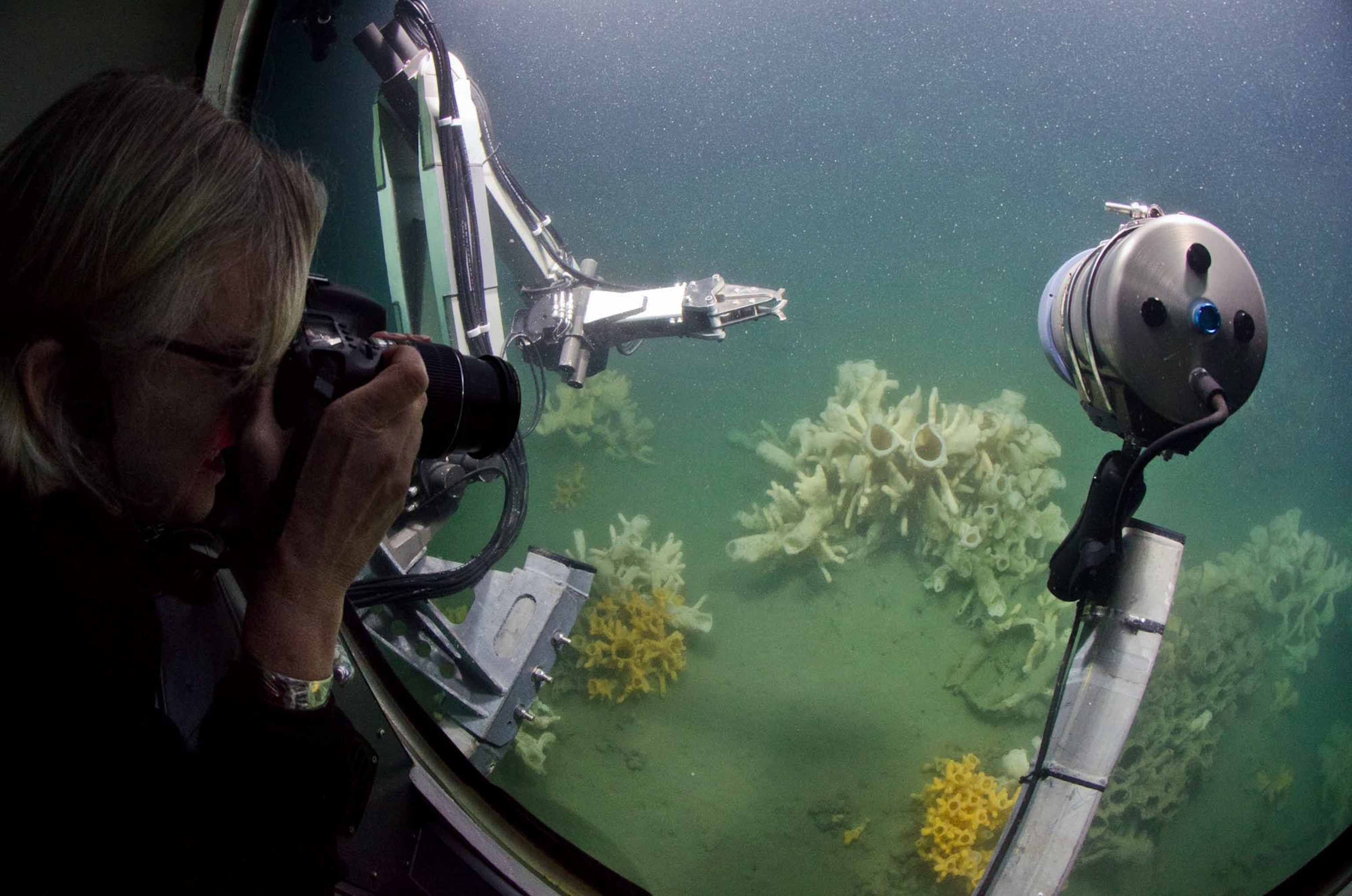
First-Ever Submarine Dive on Vancouver's "Living Fossils": Glass Sponge Reefs
Researchers discover a seafloor oasis made of hundreds of glass sponges.
Howe Sound, British Columbia—Through the submersible's acrylic viewport, a large patch of glass sponges looms up from the seafloor of Howe Sound (map), a network of fjords located on Vancouver's doorstep. The sponges glow creamy white and orange under the sub's high-intensity lamps and extend across a 40-foot-high (12.2-meter-high) mound.
"Topside, topside, be advised we have sponge at this location," senior pilot Jeff Heaton says into his communication system from a depth of 135 feet (41.1 meters).
"This is a sponge reef," says Heaton from inside the inch-thick (2.5-centimeter-thick) steel hull of the Aquarius submersible, a three-person vehicle owned and operated by Nuytco Research. "No doubt about it."
This week, the Canadian Parks and Wilderness Society (CPAWS) and Nuytco Research mounted the first submarine expedition to the glass sponge reefs found in Georgia Strait off of Vancouver.
The expedition aims to check on the status of these sponge reefs, which currently have no protection from damage by fishing activities, and to raise awareness of their existence.
The Howe Sound reef—which Aquarius will explore over the course of six dives—was first discovered in 2008, making it the most recently discovered sponge reef in southern British Columbia.
Glass sponges are found across the globe. But only along British Columbia's continental shelf do they grow over the skeletons of their dead ancestors to form massive deepwater reefs. This buildup is thanks to high levels of dissolved silica, which the sponges use to build their glass skeletons, and strong currents of cold water laden with nutrients.
"The sponge communities provide refuge for juvenile fish and they have a large filtering capacity, so they provide an important ecological function," says Bruce Reid, regional manager of Fisheries and Oceans Canada in Vancouver.
Living Undersea Fossils
For decades, scientists knew glass sponge reefs only as Mesozoic-era fossils from about 160 million years ago. These reefs once carpeted a 4,350-mile (7,000-kilometer) swath of an ancient ocean called the Tethys Ocean, making them the largest reefs in Earth's history.
But in 1986, oceanographers conducting a geophysical survey in British Columbia's Queen Charlotte Sound (map) noticed an "acoustic anomaly" on their instruments. They had just stumbled on a 9,000-year-old glass sponge reef some eight stories high—a one-of-a-kind find.
"It was like discovering a herd of dinosaurs on land," says Manfred Krautter, a paleobiologist at the University of Stuttgart in Germany. "It was like going back in time because I had been looking at the fossil sponges for decades, and here they were alive."
Further research dives revealed that these sponge reefs spanned 280 square miles (700 square kilometers) of the ocean floor along Queen Charlotte Sound and Hecate Strait (map). In 2002, more glass sponge reefs were discovered in southern British Columbia's Georgia Strait.
"One single sponge is estimated to filter 9,000 liters a day," says Danielle Ludeman, a graduate student at the University of Alberta. "So when you multiply that out over the entire reef, that's a huge amount of water that they're filtering and extracting that bacteria from."
Sponge reef densities off of Galiano Island in the Georgia Strait can reach up to 40 sponges per 11 square feet (one square meter). This means that each square foot (0.9 square meter) of the 0.6-mile-long (one-kilometer-long) reef filters about 8,600 gallons (32,700 liters) of water every day.
"So it's a major air filter but underwater," says Sally Leys, a marine biologist at the University of Alberta in Edmonton, Canada. "I'm quite sure that if we didn't have sponge reefs our water would be very different; it would probably be dirtier."
Seafloor Oases in Peril
Glass sponge reefs host high levels of biodiversity, thanks to the habitat they create for marine species. They also function as nurseries for rockfish, a very slow-growing group of fish—many of which are threatened—and are a source of food for invertebrates and fish.
"It's an oasis," Leys says of the sponge reefs. "You come along in the mud [on the seafloor] and then all of a sudden, kapoof, it's life."
Leys's research has shown that the glass sponges filter bacteria from the water and excrete ammonium, a source of nitrogen, into the ocean. "So really they're acting as a natural fertilizer of the water column," she explains.
The glass sponges, which have the consistency of meringue, are vulnerable to damage from bottom trawling—a form of commercial fishing that rakes the ocean floor for fish.
When researchers with Natural Resources Canada surveyed the sponge reefs in northern British Columbia in 2001, they discovered that more than half of the reefs were damaged—most likely by trawling.
Alaska's Marine Fisheries Service reported some 2,866 tons (2.6 million kilograms) of sponge bycatch between 1990 and 2002. The U.S. National Marine Fisheries Service estimates that 91 percent of that bycatch was caused by bottom trawling.
The sponge reefs in northern British Columbia were closed to bottom trawling in 2002. And Fisheries and Oceans Canada is currently working to designate the sponge reefs in Hecate Strait as a marine protected area.
The sponge reefs in southern British Columbia's Georgia Strait currently do not have any protection, putting them at risk of being irreparably damaged.
"Here in the Strait of Georgia, the fishing activity that is likely the most destructive, and has the biggest impact, is bottom trawling and prawn traps," says Sabine Jessen, oceans director at CPAWS.
Fisheries and Oceans Canada is currently in dialogue with local fishing stakeholders to put protection measures in place as part of a regional integrated fisheries management plan. "Our interest is to prevent physical damage of the sponges," says Reid.